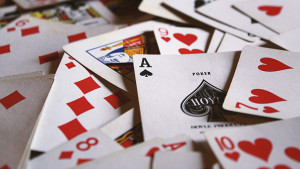As gambling venues have multiplied, so have problems they cause. James Holman looks at the problem of getting hooked.
Most people have seen or at least heard about the problems of excessive gambling. Media reports of how lives have been wasted or even lost, or wealth squandered due to an addiction to a game of chance are relatively common. Some of us have seen family members or friends who have been devastated emotionally and financially by gambling-induced problems. Last of all, a small but rising number of people find themselves slaves to a gambling habit.
What Is “Problem” Gambling?
Problem gambling is what happens when the fun goes out of gambling. This refers to gambling that goes beyond what are considered reasonable and affordable boundaries for recreation or entertainment. Pathological gambling is the inability to resist the gambling impulse—a process that occurs over an extended period and which is often characterised by increasing preoccupation with gambling and a general loss of control.
Pathological gamblers often “chase” their losses, feel a need to bet more frequently and in larger amounts, and continue to gamble in spite of the serious negative consequences of their behaviour.
There are three phases along the road to becoming a pathological gambler:
- The adventure—where an increasing desire for gambling is exciting and often includes a big win, which the gambler sees as being the direct result of their skill.
- The losses—in which the gambler bets increasing amounts of money in an attempt to recoup or “chase” the money they've lost.
- The desperation—when gambling becomes obsessive, the gambler gambles more often on credit and takes greater and greater risks.
It isn't an inevitable progression. Most people who experience a big win rarely become pathological gamblers, and some “chasers” stop before becoming obsessive. Nevertheless, most people who have decided to seek treatment have experienced the adventure, the losses and have reached the point of desperation.
And not everyone who gambles regularly is a pathological gambler, either. Many people who gamble frequently are simply people who enjoy gambling as entertainment. Generally these people set aside a predetermined amount of money for gambling, gamble for fun rather than for the “certainty” of a win, recognise that they're more likely to lose, and don't bet more than they can afford to lose.
A Long History
Gambling is not a new phenomenon. Anthropologists have found forms of gambling dating back thousands of years. Gambling with dice dates back 4000 years to ancient Egypt and horse racing around 2000 BC. The Bible contains a number of references to gambling, including Roman soldiers “casting lots” (probably stones or shells) to divide up Jesus' clothes after His crucifixion. Casinos could also be found in ancient times, where rich Romans indulged their passion for risk while residing in resorts near natural spas.
More modern forms of gambling originated later, in the Middle Ages. The first lottery games with purchased tickets and prize money were held in Europe in the early 1500s. Such lotteries were an important source of revenue to the governments of their time. In colonial America, lotteries were widely used to fund the construction of canals, bridges, buildings, roads and even to fund George Washington's army during the War of Independence.
From these humble beginnings and perhaps innocent pastimes, gambling has grown in the last century to become a worldwide multibillion dollar phenomenon. Whole cities have been built upon the lure of becoming an instant millionaire, and governments have propped up their budgets through the revenue gained from taxing gaming machines and casinos.
Although gambling has been with humankind since the beginning of civilisation, the problems that it causes have still to be remedied, and in most cases are getting worse.
Do I have A Gambling Problem?
A US test for gabling addiction - the South Oaks Gabmling Screen (SOGS) - was developed by Lesiur and Blume in 1987. the test poses questions about a gambbler's behaviour, such as wherther you chase losses, gamble more that you intended and feel quilty about gambling. It focuses on the financial aspects.
Here's a sample of questions that frequent gamblers might consider:
- Are you preoccuppied with gambling, reliing past gambling experiences, planning the next venture or thinking of ways to get money with which to gamble?
- Do you need to gamble with increasing amounts of money in order to achieve the desired excitement?
- Have you struggled though repeated, unsuccessful efforts to control, cut back or stop gambling?
- Do you gamble as a way of escaping prolbems or relieving feelings of helplessness, guilt, anxiety or depression?
- Afrer losing money gambling, do you often return another day to get even?
- Have you lied to family members, therapists or others to conceal the extent or involvement with gambling
- Do you rely on others to prove money to relieve a desperate financial situation caused by gambling?
- Are you resless or irratable when attempting to cut back or stop gambling?
If you answered "yes" to five or more of these qestions, you may have a gambling problem. How do you rate?
Effects In Australia And NZ
Australia and New Zealand suffers from some of the world's worst gambling problems. Indeed, about 2 per cent of Australians, or 290,000 people, are considered to be problem gamblers. In the 1999 to 2000 period, Australians were losing around $13 billion a year, or over $900 per head. New Zealand isn't much better. In 1998, gambling expenditure totalled $NZ1045 million, approximately double what it was seven years earlier.
In 1999, it was estimated that 41 per cent of adults gambled on a weekly basis. Apart from Australia and Sweden, which appear to have similar rates, it is higher than rates obtained from surveys conducted in other countries.
Studies from both these countries indicate that on average, at least five other people are affected by a problem gambler's behaviour, either financially or socially; that problem gamblers are twice as likely to be unemployed; and that gambling funds for most problem gamblers are derived from household funds, although seeking other funds to pay for gambling was common.
The NZ National Prevalence Survey (NPS) estimated that in 1999, 94 per cent of New Zealanders participated in at least one type of gambling activity at some time during their lives and that 86 per cent of adults had gambled at least once during the past six months.
As the gambling industry grows, so do the problems associated with it. These problems include individuals isolating themselves from family and friends; declining work performance; neglecting basic needs, such as money for food and rent; pressuring others for money and even escaping into other excesses such as alcohol, drugs and extended periods of lethargy.
There is yet hope. There are people out there that can help problem gamblers and those who are affected by problem gambling. There are also many people who have reached the bottom of the gambling pit and have survived to share their tale of hope and courage with the world.
Help For Gamblers
If you think you have a problem with gambling or know someone close to you who might have a problem, do something about it! Phone one of the helpline numbers below
In Australia: Gambler's Helpline |
|
| ACT | (02) 6247 0655 |
| NSW | 1800 633 635 |
| NT | 1880 629 683 |
| Queensland | 1800 222 050 |
| South Australia | 1800 060 757 |
| Tasmania | 1800 000 973 |
| Victoria | 1800 156 789 |
| Western Australia | 1800 622 112 |
In New Zealand: |
|
| Gambling Foundation | 0800 664 262 |
| Gambling Helpline | 0800 654 655 |
| Maori Gambling | 0800 654 656 |
| Pacific People Gambling | 0800 654 657 |
| Youth Gambling | 0800 654 659 |
| Gambling Debt | 0800 654 658 |
References:
Encarta Online.
http://www.freeyourself.com.au
http://www.relationships.com.au
http://www.naspl.org/compgamb.html
http://www.dia.govt.nz
http://www.problemgambling.vic.gov.au
“An Australian Tradition on the Up!” (Report to the Australian Parliament).
“What do we know about gambling and problem gambling in New Zealand?” Report Number 7 of the New Zealand Gaming Survey.






